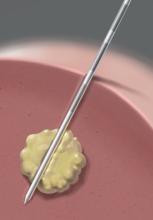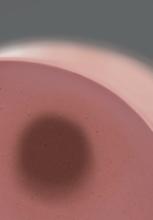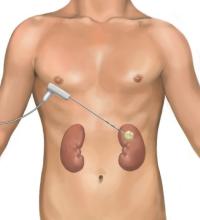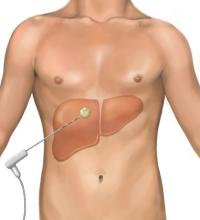The Cross-sectional Interventional Radiology (CSIR) Tumor ablation program offers patients localized treatment of a variety of cancers and conditions. Treatments offered will depend on a number of factors including type of tumor and location.
Services offered:
- Radiofrequency ablation (RFA)
- Microwave ablation (MWA)
- Cryoablation
- Ethanol ablation
- Histotripsy
Conditions treated:
- Liver cancer/neoplasm
- Renal cancer/neoplasm
- Adrenal cancer/neoplasm
- Thyroid neoplasm
- Prostate neoplasm
- Metastatic lymph nodes
- Endometriosis
What is ablative therapy?
Ablative therapy is an alternative treatment when diseased tissue is small or cannot be surgically removed. Ablation means “destroy” and is particularly beneficial for people who cannot undergo surgery due to immune deficiencies or those who have other medical conditions that would make surgery too risky.
Ablation involves inserting and placing a treatment needle through the skin into the tumor using image guidance such as ultrasound (US), computed tomography (CT) or magnetic resonance imaging (MRI). Additional ablative techniques can include delivering chemical therapeutic energy (ethanol) or focused acoustic energy (histotripsy) to the diseased tissue.
For the majority of ablations, a treatment needle is attached to a generator for radiofrequency (RFA), microwave (MWA) or cryoablation. The needle then delivers therapeutic energy (hot or cold) directly to the diseased tissue and that energy destroys the tumor. This process may need to be repeated depending on the tissue size, number and location. The destroyed tissue is not removed, but gradually shrinks and is replaced by scar tissue.

Treatment needle inserted: With treatment needle in place, the doctor will ablate the tumor using therapeutic energy.

Post-ablation lesion:The treated tumor will remain in the organ where it will shrink over time. Your doctor will monitor the treatment zone with imaging, such as CT or MRI.
What are the advantages of ablative therapy?
- Minimally invasive: uses a tiny incision (cut), the treatment needle is inserted through the incision to treat the diseased tissue.
- Less risky and has fewer complications compared to surgery
- Outpatient procedure or short hospital stay
- Localized treatment option destroys diseased cells without harming surrounding healthy tissue
- May be combined with other treatments
- Recovery time is shorter

Treatment needle is inserted directly into the kidney tumor.

Treatment needle is inserted directly into the liver tumor.
What should I expect before and after ablative therapy?
Patients will be seen in our clinic for a pre-treatment assessment a week or so prior to ablation. During the ablation, you will be given a local anesthesia and intravenous medications or general anesthesia, depending on the location and type of therapy being performed. You will be monitored closely during the therapy and afterwards. The length of recovery depends on the treatment and type of anesthesia given. As the analgesia wears off, you may feel some discomfort at the ablation site. Over the counter pain medications is usually all that is needed afterwards. Most patients are discharged the same day with simple discharge instructions. Your physician(s) will schedule follow-up appointments to see you after the procedure and follow-up imaging, often with CT or MRI, will be used to check the treatment zone and surrounding tissues.
Why University of Michigan Health?
The cross-sectional interventional radiology service (CSIR) team at U-M Health has the most experience with ablative therapies and has been performing image-guided tumor ablation since 1999.
Our team works closely with a multidisciplinary team of healthcare professionals including hepatologists, medical and surgical oncologists, transplant surgeons, urologists, radiation oncologists and interventional radiologists to provide personalized care.
We provide state-of-the-art imaging and minimally-invasive cancer treatments using all of the latest ablation technologies including: microwave, radiofrequency, cryoablation, ethanol and ultrasound (histotripsy).
Combined with our expertise of advanced diagnostic imaging (multi-phase CT, MRI, PET, contrast-enhanced US), our ablation team delivers optimal treatment outcomes for our patients. Our tumor ablation program has successfully treated thousands of patients with primary and metastatic liver cancer, renal cancer, adrenal cancer, prostate cancer, among other sites of disease (lymph nodes, thyroid, etc).
Our CSIR faculty lead ground-breaking research programs in cancer imaging and intervention. We are inventing the future of image-guided tumor ablation including the development and clinical validation of histotripsy and novel image-guidance techniques (MRI-US) that will improve tumor targeting and confirm treatment success in real time.
For more information on tumor ablation therapy, see our patient care guide.
Make an Appointment
Please call 734-936-4500 to schedule an appointment for ablation with our CSIR team.

